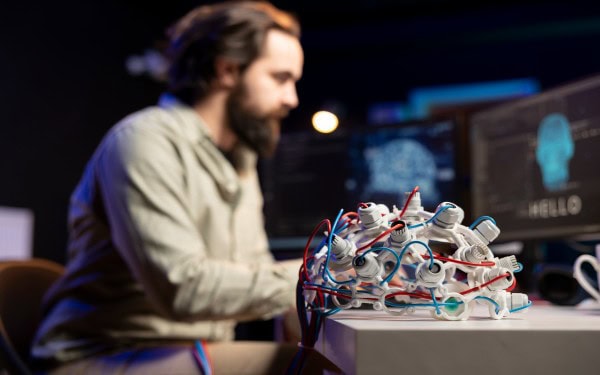This article explores the fascinating world of neuroplasticity and its implications for lifelong learning. We delve into the mechanisms that allow our brains to adapt and change throughout our lives, and how this knowledge can be applied to enhance cognitive development and learning processes. From brain training techniques to strategies for maintaining cognitive health as we age, discover how understanding neuroplasticity can empower us to keep learning and growing at any stage of life.
The Brain’s Remarkable Ability to Change
For decades, scientists believed that the adult brain was relatively fixed. However, groundbreaking research has revealed that our brains possess an extraordinary ability to reorganise and adapt throughout our lives. This property, known as neuroplasticity, is revolutionising our understanding of learning, memory, and cognitive development. At its core, neuroplasticity involves the strengthening or weakening of synaptic connections between neurons. When we learn something new or repeat an action, the connections between relevant neurons are reinforced, making the neural pathway more efficient. This process is often summarised as “neurons that fire together, wire together.” Scientists disstinguish several types of brain adaptability:
- Structural changes: Alterations in the brain’s physical structure, including the growth of new neurons and synapses
- Functional shifts: The brain’s ability to move functions from a damaged area to undamaged areas
- Synaptic modifications: The ability of synapses to strengthen or weaken over time in response to increased or decreased activity
While the brain’s capacity for change is particularly pronounced during childhood, neuroplasticity continues throughout our lives. Even in adulthood and old age, our brains retain the ability to adapt, underlying our capacity to learn new skills, form memories, and recover from injuries.
Harnessing Brain Plasticity for Cognitive Development
The principles of brain adaptability have profound implications for cognitive development, from early childhood through adulthood. By understanding how our brains change in response to experience, we can design more effective learning strategies and interventions. Research has identified critical periods in development when the brain is particularly receptive to certain types of input. However, cognitive training techniques can help us tap into our brain’s adaptability even outside these critical periods, allowing for continued learning and skill development throughout life. In this regard, environmental enrichment – exposure to stimulating environments and experiences – has been shown to enhance the brain’s capacity for change. This concept has applications in education, where diverse, engaging learning environments can promote cognitive development and facilitate learning processes. Whether we’re learning a new language, mastering a musical instrument, or acquiring a complex motor skill, our brain’s adaptability is at work. Repetition and practice strengthen neural pathways, leading to improved performance and, eventually, automaticity in skill execution.
Lifelong Learning: Nurturing the Ageing Brain
As we develop and age, our brains naturally undergo changes. However, the principles of neural adaptability offer hope for maintaining cognitive health and continuing to learn throughout our lives. The concept of cognitive reserve suggests that engaging in mentally stimulating activities throughout life can help protect against cognitive decline. By continually challenging our brains, we can build a “reserve” that may help compensate for age-related changes or even pathological processes. Research suggests several strategies for maintaining cognitive health as we age:
- Engaging in regular physical exercise, which promotes brain health and plasticity
- Pursuing mentally stimulating activities, such as learning new skills or solving puzzles
- Maintaining social connections, which provide cognitive stimulation and emotional support
- Getting adequate sleep, crucial for consolidating memories and maintaining brain health
- Following a healthy diet rich in nutrients that support cognitive function
Continued learning in adulthood and old age is not just possible, but beneficial for brain health. Learning new skills, especially those that are complex and engage multiple areas of the brain, can help maintain and even improve cognitive function.
The Future of Brain Plasticity Research and Applications
As our understanding of neuroplasticity continues to grow, new avenues for application and research are emerging. Dr. Christian Beste, a prominent researcher in this field, has been exploring innovative approaches to harnessing brain plasticity for cognitive enhancement and rehabilitation.
Dr. Beste’s work suggests that targeted interventions based on principles of neuroplasticity could have significant implications for treating neurological and psychiatric disorders. These interventions might include specialised cognitive training programs, non-invasive brain stimulation techniques, or even pharmacological approaches that enhance the brain’s capacity for change. For instance, research is ongoing into the use of transcranial magnetic stimulation (TMS) to promote neuronal adaptation in stroke recovery and the treatment of depression. Similarly, cognitive training programs based on principles of brain plasticity are being developed for conditions ranging from ADHD to schizophrenia.
The future of education and cognitive enhancement may lie in personalised approaches that leverage our understanding of brain adaptability. Christian Beste and his colleagues are investigating how individual differences in neural plasticity might inform tailored learning strategies and cognitive training programs. This could lead to educational approaches that are customised to each learner’s unique neural profile, maximising their learning potential. In the realm of cognitive enhancement, we might see the development of personalised brain training regimens designed to target specific cognitive functions based on individual needs and goals.
In conclusion, our understanding of neuroplasticity offers a powerful framework for comprehending how we learn and adapt throughout our lives. By applying this knowledge, we can develop more effective strategies for education, cognitive health, and personal growth. As researchers continue to unravel the mysteries of brain plasticity, we move closer to unlocking the full potential of our remarkably adaptable brains, opening new possibilities for lifelong learning and cognitive well-being.







